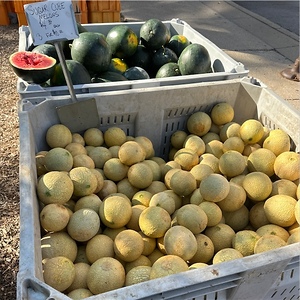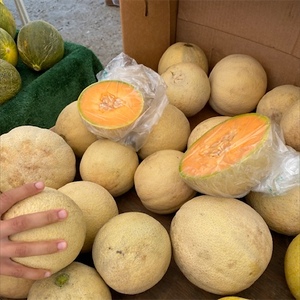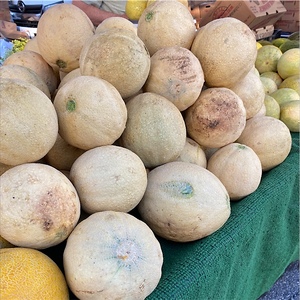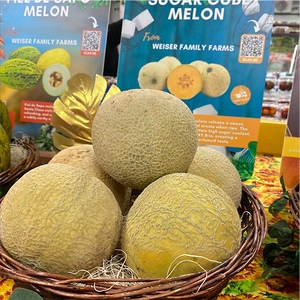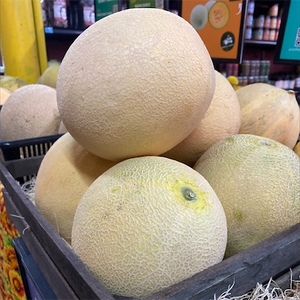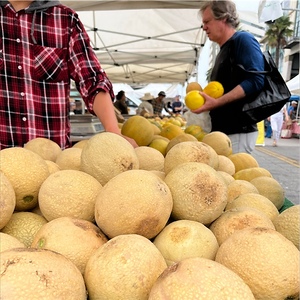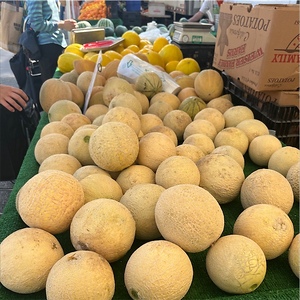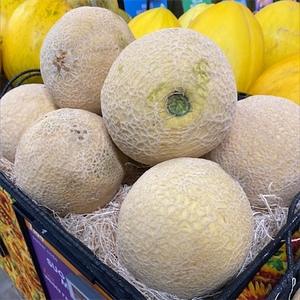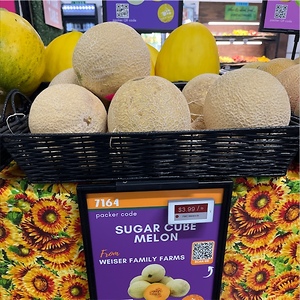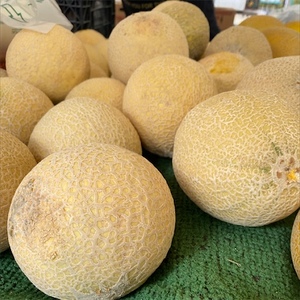

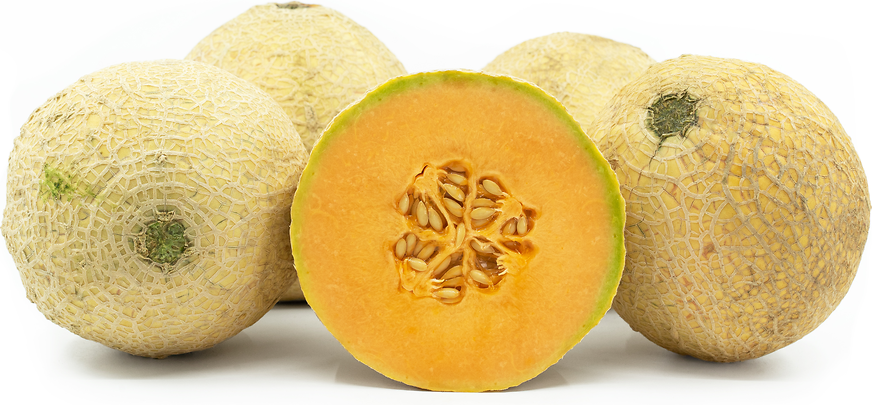
Sugar Cube Melons
Estimated Inventory, ea : 0
This item was last sold on : 06/22/25
Description/Taste
Sugar Cube melons are small in size, averaging 10 to 12 centimeters in diameter, and have a uniform, round to oval shape, generally weighing 2 to 4 pounds. The melons have firm, green skin that transforms into a beige, pale yellow hue when ripe, and the entire surface is covered in a raised, rough, and coarse tan netting. Underneath the rind, the bright orange to salmon-hued flesh is dense, tender, aqueous, and succulent. A small central cavity is also filled with tapered ivory seeds suspended in a web of stringy orange fibers. It is important to note that the seed cavity is smaller than other melon varieties, yielding a melon with more edible flesh. Sugar Cube melons release a sweet, fruity, and floral aroma when ripe. The melons also contain high sugar content, reaching up to 14% Brix, creating a sweet, sugary, perfumed taste.
Seasons/Availability
Sugar Cube melons are available in the summer.
Current Facts
Sugar Cube melons, botanically classified as Cucumis melo, are a hybrid variety belonging to the Cucurbitaceae family. The small, personal-sized melons were developed in the 21st century in New York State as an improved breakfast-type melon. Sugar Cube melons are known for their exceptionally sweet taste, juicy flesh, and perfumed fragrance. The boutique melons are not commercially grown on a wide scale, but they are often sought-after seasonal melons at farmers markets and specialty wholesalers. Sugar Cube melons are also a popular home garden variety. The melons grow on compact, vining plants capable of being raised in containers and small gardens, and the melons are ready for harvest approximately 80 days after sowing. Sugar Cube melons are also nicknamed as one of the most disease-resistance melons and were specifically bred to withstand common melon diseases such as mosaic virus, papaya ring spot virus, fusarium wilt, and powdery mildew. When in season, Sugar Cube melons have the ability to maintain their sweet nature with extended storage, and the flesh is utilized by chefs in an array of fresh preparations.
Nutritional Value
Sugar Cube melons are a source of potassium to balance fluid levels within the body, vitamin A to maintain healthy organ functioning, and vitamin C to strengthen the immune system. The melons also provide electrolytes to keep the body adequately hydrated, phytonutrients that act as an anti-inflammatory and contain other nutrients, including zinc, phosphate, calcium, vitamin K, and magnesium. In addition to vitamins and minerals, Sugar Cube melons have high water content, providing added hydration.
Applications
Sugar Cube melons have a sweet and floral taste suited for raw and cooked preparations. The melon’s small size allows it to be sliced in half and consumed as two single servings, or the entire melon can be cut and served. Sugar Cube melons are popularly halved, removing the seeds, and filled with yogurt or cottage cheese as a breakfast dish, sliced into fruit mixes, green salads, and tomato and herb medleys as a light, summer meal, or chopped into salsa. The melons can also be cut into wedges and wrapped in prosciutto, blended into chilled soups, or combined into sauces as a sweet addition. Sugar Cube melons can be used interchangeably in most recipes for cantaloupe or muskmelon. In addition to slicing the flesh, Sugar Cube melons are naturally high in water, allowing them to create flavorful juices and smoothies. The melons can also be blended and frozen into granitas, sorbets, and popsicles, or they can be scooped with a baller and used as a topping over vanilla ice cream. Sugar Cube melons pair well with cream, feta cheese, cured meats, fruits such as grapefruit, strawberries, coconut, blueberries, and grapes, cucumbers, arugula, herbs including mint, basil, and cilantro, and balsamic vinegar. Whole, uncut Sugar Cube melons will keep for 1 to 2 weeks at room temperature or in the refrigerator. Once opened, slices of the flesh should be stored in a sealed container or wrapped in plastic in the fridge and kept for 4 to 5 days.
Ethnic/Cultural Info
Sugar Cube melons were named after their petite size and exceptionally sweet flesh. Since their release, the personal-sized melons have become a favored specialty variety across the United States, but the sugary-sweet cultivar remains a local favorite among farmers markets near the melon’s origination site at the Seneca Vegetable Research trial fields in Hall, New York. Seneca Vegetable Research is a family-owned and operated seed company led by Dr. Walt Whitwood in Hall, New York. Dr. Whitwood has a Ph.D. in seed breeding from Iowa State University and purchased the late Robson Research Farm in 2001, re-establishing the acreage as Seneca Vegetable Research. The company focuses on creating new varieties of melons, sweet corn, and other fall vegetables that can survive in the fickle northeastern United States’ climate. The company also uses traditional breeding practices, humorously highlighting their “high-tech” methods of using pairing knives and paper bags with twist ties to develop new cultivars. Seneca Vegetable Research is known for releasing several successful varieties of melons and pumpkins, including Sugar Cube, and is continuing to make strides in vegetable breeding due to the Whitwood family’s passion for agriculture. In the late summer, the company also opens its 40-acre trial fields to industry professionals to host a field day event, showcasing their products for the upcoming season.
Geography/History
Sugar Cube melons were developed by Dr. Walt Whitwood of Seneca Vegetable Research in New York State in partnership with breeder Brent Loy at the New Hampshire Agricultural Experiment Station. The hybrid melon was created sometime in the early 21st century and was specifically bred to showcase improved disease resistance, storage abilities, and a sweeter flavor. The melon was also designed to thrive in the growing conditions of the northeastern United States. Today Sugar Cube melons are a specialty melon variety primarily offered through seed catalogs in the United States and Canada. The melons are also cultivated by select farms and are sold through farmers markets and distributors nationwide.
Featured Restaurants
Restaurants currently purchasing this product as an ingredient for their menu.
| Golden Door | San Marcos CA | 760-761-4142 |
| Solare Ristorante Lounge | San Diego CA | 619-270-9670 |
| Joya Kitchen | San Diego CA | 619-255-5979 |
| Giuseppe Restaurants & Fine Catering | San Diego CA | 619-436-7006 |
| Kettner Exchange | San Diego CA | 909-915-9877 |
| Fairmont Grand Del Mar | San Diego CA | 858-314-1975 |
Recipe Ideas
Recipes that include Sugar Cube Melons. One
| Honest Cooking |
|
Cantaloupe and Cherry Popsicles |
| The Edible Perspective |
|
Seasonal Smoothie |



